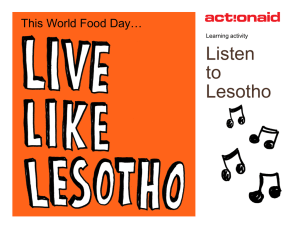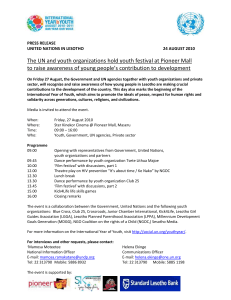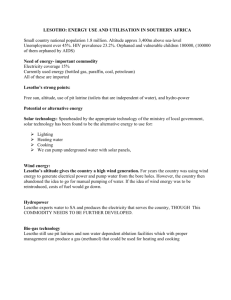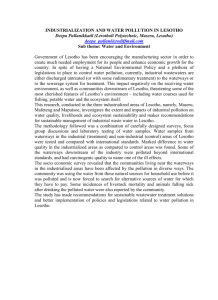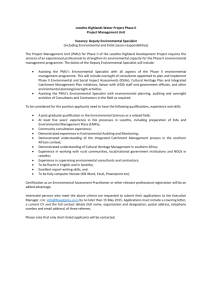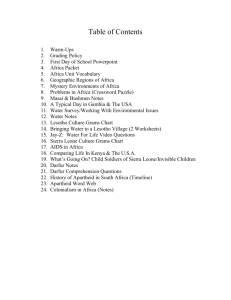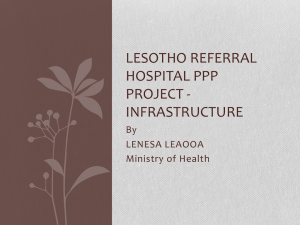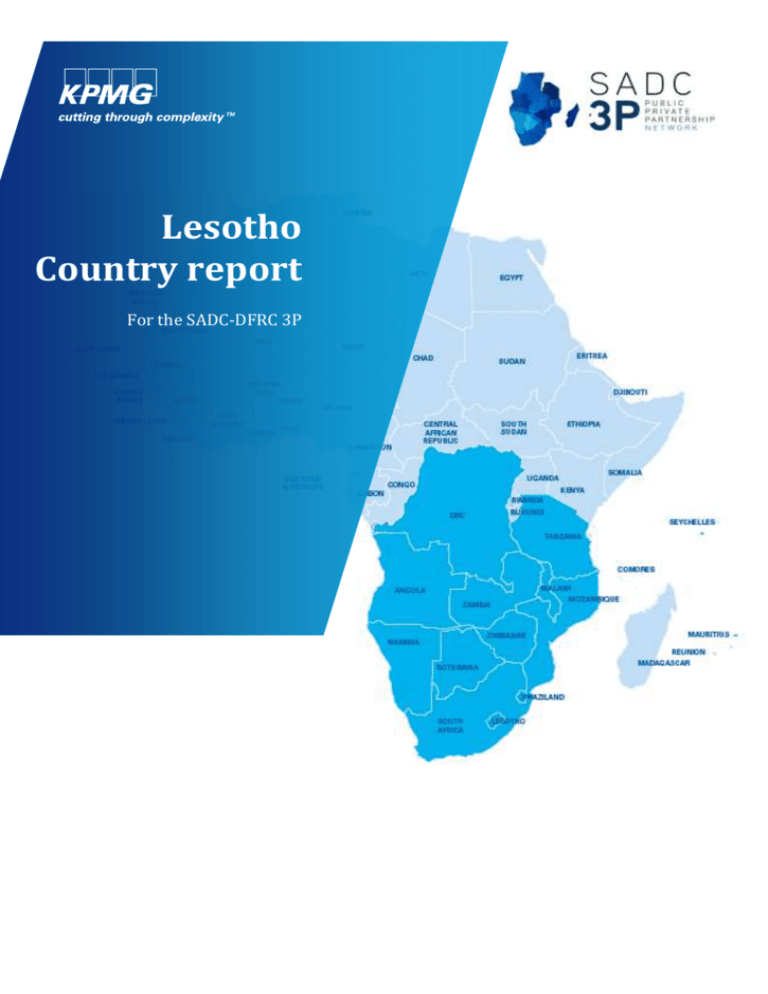
Lesotho
Country report
For the SADC-DFRC 3P
Contents
1
Overall evaluation of the Lesotho’s readiness for PPPs
1
1.1
Background
1
1.2
Attractiveness of the member countries
1
1.3
Availability of domestic capital and debt funding
2
1.4
Judicial system
2
1.5
Governance and decision making
3
1.6
Ease of doing business in the member country
3
1.7
PPP environment in the member country
4
1.8
Observations
5
1.9
Conclusion
5
Lesotho
1
Overall evaluation of the Lesotho’s
readiness for PPPs
1.1
Background
We evaluated the Member Country by looking at 6 broad categories, containing a number of subcategories. The six (‘6’) broad categories include:
■
■
■
■
■
■
Attractiveness of the member countries
Availability of domestic capital and debt funding
Judicial system
Governance and decision making
Ease of doing business in the member country
PPP environment in the member country
The information and indicators were obtained from external sources like World Bank, World Economic
Forum, IFC, Ibrahim Index of African Governance, KPMG country reports and actual visits to the member
countries (with exception to three (‘3’) countries, namely , Democratic Republic of Congo, Swaziland and
Seychelles). Where possible, KPMG utilised its in-country office to address the categories and answer
questions surrounding the projects.
During the country visit we were hosted by the PPP Unit of the Ministry of Finance. This team facilitated
meetings with the following key stakeholders:
■
■
■
■
■
Ministry of Finance (Private Sector Development Programme & the Principal Secretary)
Ministry of Development Planning
Ministry of Public Works and Transport
Nedbank Lesotho
Stanlib Lesotho
Each sub-category was rated either one (‘1’), two (‘2’), three (‘3’) or four (‘4’) based on the indicators
from various reputable sources. Where one (‘1’) and two (‘2’) refers to “Developing towards PPP
readiness” and three (‘3’) and four (‘4’) indicates a “Maturing level of PPP readiness”. Where no
information was available, no value was given. Where there was an element of subjectivity, KPMG, based
on years of experience, applied its own mind in coming up with a value. The overall broad category value
is addressed in more detail below.
1.2
Attractiveness of the member countries
Attractiveness of the member country
Source of information
Results
GDP % growth for last 3 years
World Bank
4.2%
Actual GDP in numbers (size of economy),
current USD$
World Bank
US $2.4 billion
1
Lesotho
Lending Interest rates
www.trading economics.com/countrylist/inflation-rate
10.4%
Inflation rate
www.trading economics.com/countrylist/inflation-rate
5.07%
Credit Rating
Moody
Stable
Political Stability and Absence of Violence
(0 to 100)
Governance indicator, World bank
55.7
Macro-Economic Environment (1 to 7)
The Global Competitiveness Report
2012-2013, World Economic Forum
3.93
Attractiveness of Lesotho, overall result is a two (‘2’)
Lesotho has a relatively small economy with a GDP of USD2.4billion, although this has grown at an
average of 4.2% over the last three years. Its credit rating is Moody’s Ba2 with a negative rating, partly
based on the poor structural factors in the economy including a low GDP/capita and a very limited private
sector. This analysis results in an overall value of two (‘2’), Lesotho is thus considered “developing” in
terms of this category.
1.3
Availability of domestic capital and debt funding
There are 4 Commercial banks in Lesotho, all of whom are subsidiaries of South African banks. There are
five insurance companies, two collective investment schemes, insurance brokers, and credit and savings
cooperatives. There are a number of equity and pension funds.
Commercial banks in Lesotho are considered to relatively conservative, as many of the projects proposed
are not bankable. There is a view that financing conservatism is due to the financial sector legislation
which is relatively constraining in terms of the requirements for the financial sector, and banks in
particular.
Availability of domestic capital and debt funding in Lesotho, overall result is a two (‘2’)
This analysis results in an overall value of two (‘2’), Lesotho is thus considered “developing” in terms of
this category.
1.4
Judicial system
Judicial system that contributes to effective
commercial dispute resolution
Results
Source of information
Enforcing Contracts (country rank 1 to 185)
139
Doing Business 2013 – The World
Bank and IFC
Rule of Law (0 to 100)
47.4
Governance indicator, World bank
We used the key indicator ‘Enforcing Contracts’ from Doing Business as they focuses on how public
institutions function in the case of a commercial dispute1. Doing Business measures the time, cost and
procedural complexity of resolving a commercial lawsuit.
Judicial system of Lesotho, overall result is a one (‘2’)
1
Doing Business 2013, the World Bank and IFC
2
Lesotho
Lesotho ranked 139th in the world in the enforceability of contracts and rated 47.4 out of 100 for
application of the Rule of Law, this analysis results in an overall value of two (‘2’), Lesotho is thus
considered “developing” in terms of this category.
1.5
Governance and decision making
Governance and decision making in member
country
Results
Source of information
Institutions (score 1 to 7)
3.3
The Global Competitiveness Report
2012-2013,
World
Economic
Forum
Africa’s Governance (score out of 100)
61
Ibrahim
Index
Governance
Voice and accountability (rating of 0 to 100)
45.1
Governance indicator
Government effectiveness (rating of 0 to 100)
44.5
Governance indicator
Regulatory Quality (rating of 0 to 100)
30.3
Governance indicator
Control of Corruption (rating of 0 to 100)
64.5
Governance indicator
of
African
Governance and decision making of Lesotho, overall result is a one (‘1’)
Lesotho was given a rating of 61 out of 100 for governance by the Ibrahim Index of African Governance
and a government effectiveness rating of 44.5.
This analysis results in an overall value of one (‘1’), Lesotho is thus considered “developing” in terms of
this category.
1.6
Ease of doing business in the member country
Ease of doing business in the member country
Results
Starting a business (country ranking from 1 to
185)
79
Doing Business 2013 – The World
Bank and IFC
Dealing with Construction permits (country
ranking from 1 to 185)
140
Doing Business 2013 – The World
Bank and IFC
Getting electricity
185)
(country ranking from 1 to
133
Doing Business 2013 – The World
Bank and IFC
Register property
185)
(country ranking from 1 to
157
Doing Business 2013 – The World
Bank and IFC
Getting credit (country ranking from 1 to 185)
154
Doing Business 2013 – The World
Bank and IFC
Protecting investors
185)
100
Doing Business 2013 – The World
Bank and IFC
Paying taxes (country ranking from 1 to 185)
95
Doing Business 2013 – The World
Bank and IFC
Trading across borders (country ranking from 1
to 185)
144
Doing Business 2013 – The World
Bank and IFC
(country ranking from 1 to
Source of information
3
Lesotho
Resolving insolvency (country ranking from 1 to
185)
75
Doing Business 2013 – The World
Bank and IFC
Overall ease of doing business in the member
country
136
Doing Business 2013 – The World
Bank and IFC
Ease of doing business in Lesotho, overall score is a one (‘1’)
Lesotho is ranked 79th in the world for Starting a Business, and 154th for Getting Credit and a far poorer
140th for Dealing with Construction Permits.
This analysis results in an overall value of one (‘1’), Lesotho is thus considered “developing” in terms of
this category.
1.7
PPP environment in the member country
Enabling environment in the member country for PPPs
Source of information
Legal system enabling PPPs in the member country
-
Is there a presence/development of enabling
legislation ie PPP Law/ regulations etc?
-
Does a policy for private participation in the
member country exist?
-
Public Sector appetite/capacity and experience
relating to PPPs in the member country
Lesotho has a draft PPP policy. This
policy will be approved by Cabinet by
the end of July 2013. Thereafter,
legislation will be drafted and
enacted. However, in the absence of
this legislation at the moment, the
existing legislative environment still
allows for PPPs to be implemented.
Private participation is enabled by
the existing legislation, as discussed
above.
In general, there is not much
awareness of what PPPs actually
entail. As a result there is a common
misconception that PPPs translate
into privatisation. In addition to this,
there is also a view that PPPs could
undercut the socio-economic
imperatives of government and this
is particularly important given the
levels of poverty in Lesotho as it is
ranked as one of the Least Developed
Countries (LDC) by the World Bank.
Is there Political support for PPPs?
-
Is there a PPP focal point/ Unit in the member
country?
The Ministry of Finance in Lesotho
does have a small team of people who
are driving the PPP policy. This is the
unit that has been driving the
drafting of the PPP policy and they
have set up a program for creating
awareness of the policy amongst
politicians and government officials.
4
Lesotho
-
Does an existing PPP track record in the member
country exist?
According to officials, a number of
PPPs have been implemented to date.
One PPP is often used as an example
of PPPs in Lesotho; it was for the
renovation and operation of Queen
Mamohato Memorial Hospital. The
PPP process began in 2006 and was
then fully operational by 2011. The
IFC was the transaction advisor for
this PPP.
Currently, there are a number of
challenges that are being experienced
in the operational phase which relate
to monitoring of the implementation
of the project. There is also a view
that the project has not provided
sufficient value for money.
Private sector capacity, capability and appetite
-
Are multiple firms active in the PPP market?
Yes
-
Does capacity exist in the private sector?
Capacity is a big constraint in
Lesotho, particularly human capacity,
with many skills being acquired and
utilized from South Africa. Many
businesses in the financial sector
undertake certain operations through
their South African parent
companies.
PPP environment in the Lesotho, overall score is a two (‘3’)
Lesotho is in the process of developing a PPP Policy and has a PPP Unit in the Ministry of Finance.The 390
bed Queen ‘Mamohato Memorial Hospital is a full service referral hospitals procured as a PPP in Maseru.
This analysis results in an overall value of three (‘3’), Lesotho is thus considered “developing” in terms of
this category.
1.8
Observations
Our results are based on the most recent verifiable information available at time of the report
Reputable external sources were used where appropriate and fact based observations were made.
Representative of the member countries PPP units did not recognise most of the projects identified in the
RIDMP and STAP. In addition to this, a number of the projects are already in implementation phase.
1.9
Conclusion
The legislative environment in Lesotho does enable the implementation of PPP, in addition to this, the
PPP policy and legislation will be enacted in the near future. Political will and support for the
implementation of PPPs is a key requirement and there is a view that once PPP policy framework is in
place, and the PPP unit has undertaken activities to raise awareness, this will provide the level of
transparency required in order to gain full political support.
Lesotho also has a track record in the implementation of PPPs (the renovation of the Queen Mamohato
Memorial Hospital being the most prominent example), however, there are a number of challenges that
have ensued in the operational phase of this PPP.
5
Lesotho
Some of the key challenges and constraints to implementing PPPs include the constraining financial
sector environment and therefore a potential lack of appetite for local investment.
Overall Lesotho is thus considered “developing” in terms of this category.
6
© 2013 KPMG Services (Pty) Ltd, a South African company and a member firm of the KPMG
network of independent member firms affiliated with KPMG International Cooperative (“KPMG
International”), a Swiss entity. All rights reserved.
The information contained herein is of a general nature and is not intended to address the
circumstances of any particular individual or entity. Although we endeavour to provide
accurate and timely information, there can be no guarantee that such information is accurate as
of the date it is received or that it will continue to be accurate in the future. No one should act
on such information without appropriate professional advice after a thorough examination of
the particular situation.
The KPMG name, logo and “cutting through complexity” are registered trademarks or
trademarks of KPMG International.


